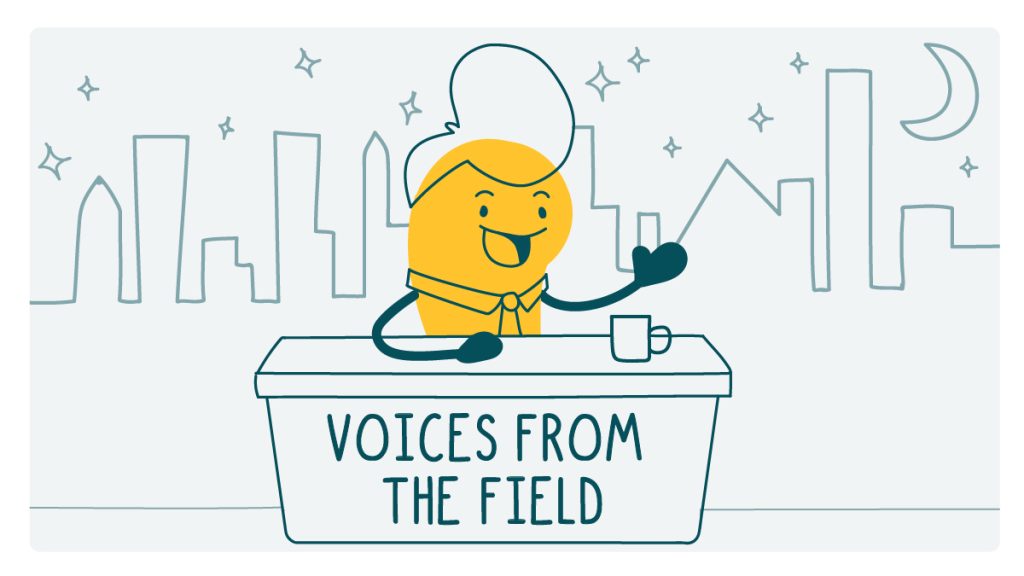
This week, we’re excited to bring you another post in our new(ish) series “Voices From the Field.” We chatted with Ashani Johnson-Turbes, Vice President at NORC (and President of the Society for Health Communication!). NORC at the University of Chicago is an objective, nonpartisan research organization that works with government agencies, nonprofits, foundations, and commercial organizations.
Ever since she started her career working on environmental issues with the Chicago Housing Authority in the 1990s, Ashani’s been a fervent advocate of promoting equity — long before the term became popular. “Nowadays, ‘equity’ is popular and ubiquitous. It’s a buzzword that gets used a lot, but the concept itself has been around for a very long time,” Ashani says. “At its core, equity refers to things being fair, just, and impartial. That’s what our work is really about.” And her work is leading a team of experts at NORC in what she calls “Equity Science”: the study and practice of efforts to advance equity across research and evaluation to make research methods better. In the public health space, the Centers for Disease Control and Prevention (CDC) refers to it as “health equity science — the examination of patterns and factors that contribute to health inequities.”
Why is that important, you ask? Well, for one thing, social science research — the study of human behavior and relationships — influences many policy decisions that affect public health. Social and behavioral science informs decisions on how funding is allocated, how public health campaigns are designed, and what programs and services are needed and developed. But historically, some groups of people have been absent from not only the research, but also from the process of making decisions about what kind of research is important and is being conducted — and how that’s done.
Being left out means that their voices, concerns, needs, experiences, and expertise weren’t reflected in data, outcomes, or decision-making about how to use results. “As social science researchers, we must not only strive to improve research processes that left many groups absent or inadequately represented,” Ashani says. “We must also understand the historical context that led to some groups being invisible — and acknowledge that trustworthy and valid research cannot happen without inclusivity.”
That’s why Ashani and her team developed the Community-Engaged Research (CEnR) Framework — and why they’re currently developing the Inclusive and Equitable Research Framework™, which will offer an action-oriented blueprint for embedding inclusivity and equity throughout the research cycle. Both frameworks can guide health communication and other scientists in making study designs, data collection tools, analyses, and communication inclusive and equitable.
The Inclusive and Equitable Research Framework will highlight 4 main principles:
- Positionality and self-reflection. Acknowledge and reflect on the fact that researchers bring the full sum of their life, history, identity, and biases (conscious or unconscious) to the research process.
- Culture and community engagement. Center your intended audience’s culture and lived experience in the research cycle through authentic community engagement. “Engaging people in the community in the entire research process will add to the validity and trustworthiness of your data and results,” Ashani points out.
- Make research available, accessible, and easy-to-understand for everyone involved. This can help dismantle power hierarchies between researchers and the people and communities they work with.
- Systems thinking. Ensure that your research moves beyond focusing on individual knowledge, attitudes, and behaviors to examine the social, economic, and political structures that influence people’s lives.
The bottom line: Equity can sometimes seem like just another health comm buzzword. Ashani Johnson-Turbes reminds us that “equity can be a verb and a process” — and that promoting equity means promoting what is fair, just, and impartial, in research and beyond.
Copy/paste to share on social (and tag us!): This week, CommunicateHealth’s blog series “Voices From the Field” features Ashani Johnson-Turbes, Vice President at NORC. Don’t miss out on this conversation: https://communicatehealth.com/wehearthealthliteracy/voices-from-the-field-ashani-johnson-turbes-norc-center-on-equity-research/ #HealthLiteracy #HealthComm
Browse recent posts